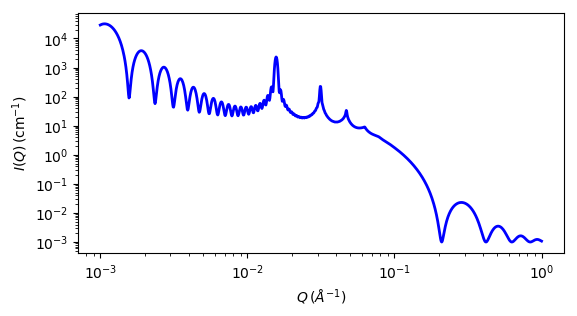lamellar_stack_caille
Random lamellar sheet with Caille structure factor
Parameter |
Description |
Units |
Default value |
|---|---|---|---|
scale |
Scale factor or Volume fraction |
None |
1 |
background |
Source background |
cm-1 |
0.001 |
thickness |
sheet thickness |
Å |
30 |
Nlayers |
Number of layers |
None |
20 |
d_spacing |
lamellar d-spacing of Caille S(Q) |
Å |
400 |
Caille_parameter |
Caille parameter |
Å-2 |
0.1 |
sld |
layer scattering length density |
10-6Å-2 |
6.3 |
sld_solvent |
Solvent scattering length density |
10-6Å-2 |
1 |
The returned value is scaled to units of cm-1 sr-1, absolute scale.
This model provides the scattering intensity, I(q)=P(q)S(q), for a lamellar phase where a random distribution in solution are assumed. Here a Caille S(q) is used for the lamellar stacks.
Definition
The scattering intensity I(q) is
The form factor is
and the structure factor is
where
Here d = (repeat) d_spacing, δ = bilayer thickness, the contrast Δρ = SLD(headgroup) - SLD(solvent), K = smectic bending elasticity, B = compression modulus, and N = number of lamellar plates (n_plates).
NB: When the Caille parameter is greater than approximately 0.8 to 1.0, the assumptions of the model are incorrect. And due to a complication of the model function, users are responsible for making sure that all the assumptions are handled accurately (see the original reference below for more details).
Non-integer numbers of stacks are calculated as a linear combination of results for the next lower and higher values.
The 2D scattering intensity is calculated in the same way as 1D, where the q vector is defined as

Fig. 49 1D plot corresponding to the default parameters of the model.
Source
lamellar_stack_caille.py
⋆ lamellar_stack_caille.c
References
F Nallet, R Laversanne, and D Roux, J. Phys. II France, 3, (1993) 487-502
J Berghausen, J Zipfel, P Lindner, W Richtering, J. Phys. Chem. B, 105, (2001) 11081-11088
Authorship and Verification
Author:
Last Modified by:
Last Reviewed by: